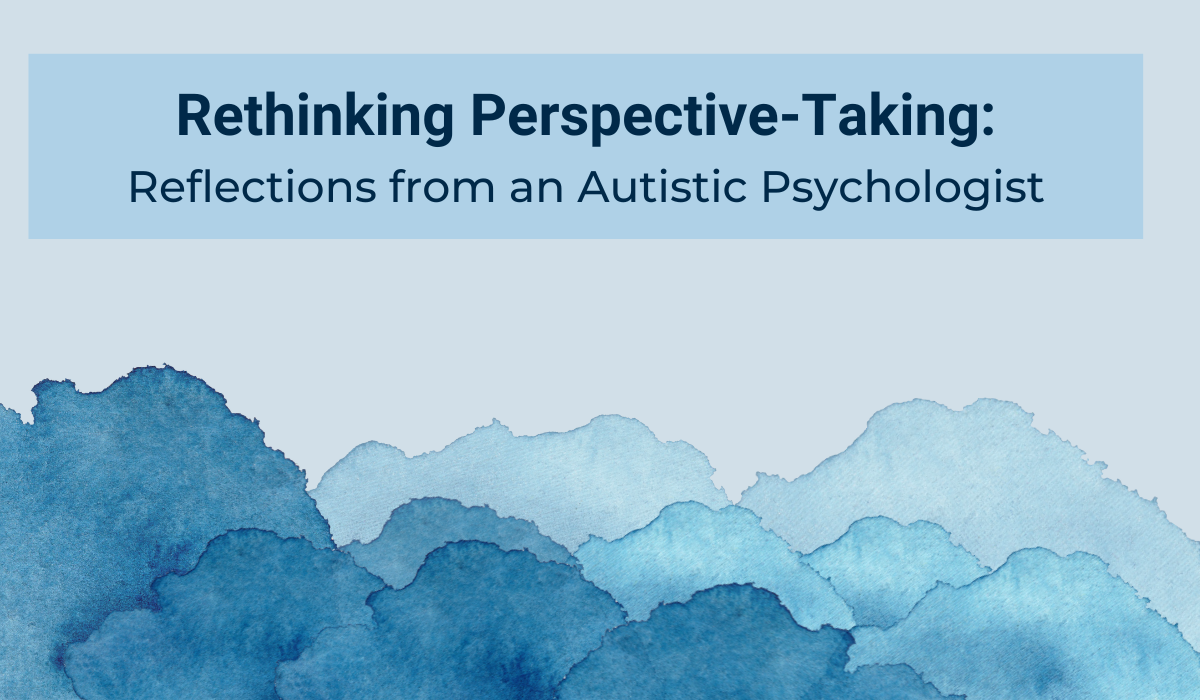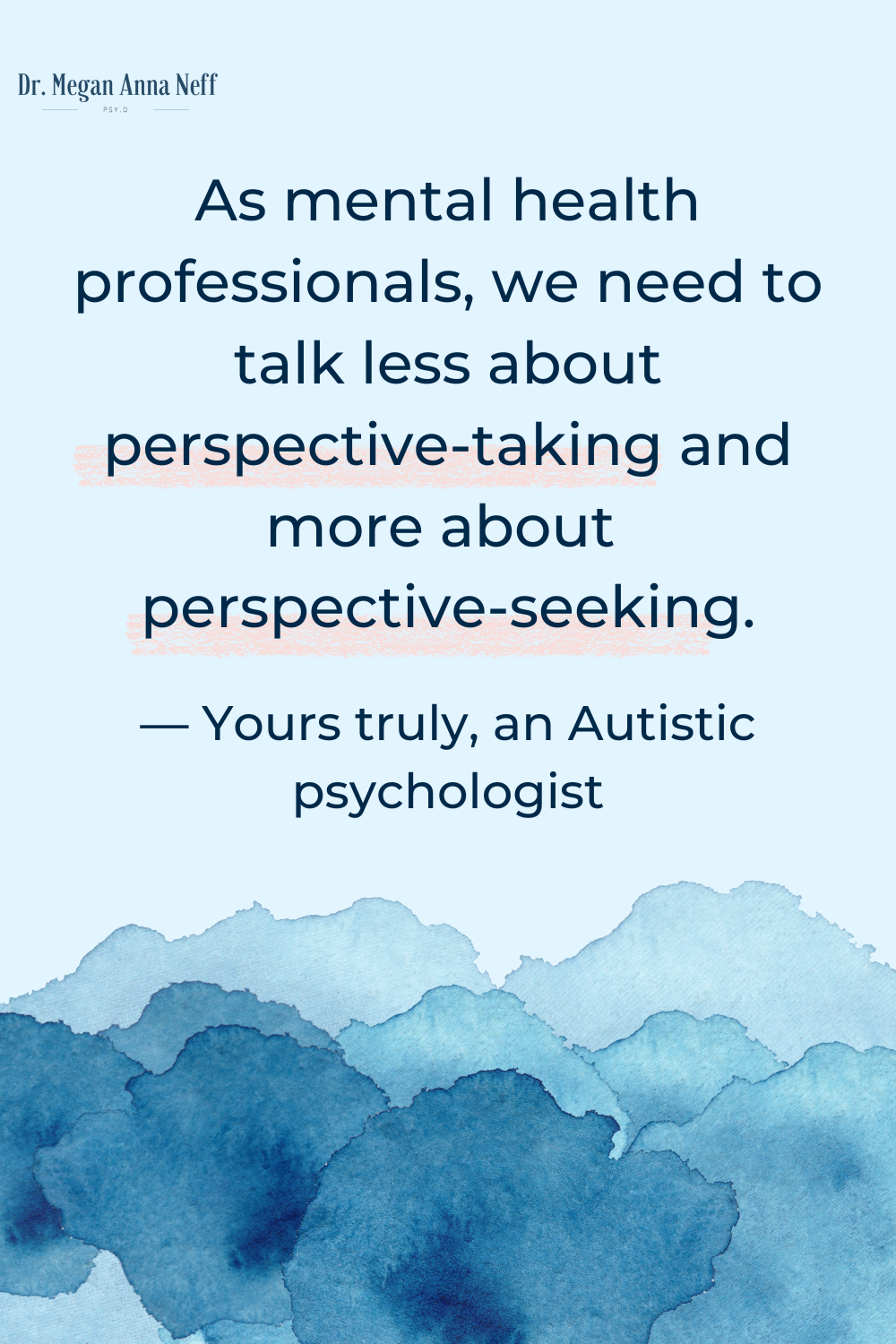Rethinking Perspective-Taking: Insights from an Autistic Psychologist
Perspective-Taking vs. Perspective-Seeking
I’ve been slowly making my way through Adam Grant’s Think Again. Today, I read a passage that caught my attention and got me thinking. Grant contrasts perspective-taking with perspective-seeking, arguing that we should aim to gain insight into the nuances of other people’s views through conversation rather than assuming we can fully take on their perspective.[1]
As an Autistic psychologist, the topic of perspective-taking naturally raises several thoughts, associations, and complex emotions, so I was instantly drawn into this concept of perspective-taking vs. perspective-seeking. It is also helping me to find more language to describe the nuances of my experience with subjectivity and perspective as an Autistic person.
Navigating Perspective as an Autistic Person: My Personal Reflections
On one hand, Autistic people are often unfairly accused of being poor at perspective-taking, when in reality the double-empathy problem explains that it is more about difficulties understanding the perspectives of people with different neurotypes.[2] On the other hand, I encounter moments every day where I realize I’ve had a perspective-taking oversight. For example, when I am having a conversation in my head and bring my spouse into the conversation halfway through, forgetting that he has not been in my head for the first part of the conversation! For me, what feels like a natural continuation of a conversation can feel like an abrupt and random start to a conversation for others.
Or there are the more embarrassing stories of perspective-taking difficulties. Like the time in my early 20s when I inadvertently exposed myself to my Princeton neighborhood. I was a graduate student, living in a 200-year-old Princeton home with large bay windows that faced the street near our campus. At night, I would often wander around the house in a bra or wearing a sari draped over my scantily clad body. One night, my friends looked at me and said, “Meg, you know people can see you, right?” I casually replied, “But it’s dark outside.” They looked at each other (perhaps to determine if I was joking), then burst out laughing and said, “That means they can see you even more clearly!” It hadn't occurred to me that someone who I could not see could see me. Here I was, a 24-year-old in an Ivy League graduate program, learning about the mechanisms of object relations and perspective that most 4- and 5-year-olds are learning!
My difficulties with perspective-taking are not of the kind typically associated with autism, but they are real. I do believe some neurological underpinnings make perspective-taking more difficult for me, and it shows up in silly ways, like walking around my house in a bra for the neighborhood to see or having fragmented conversations with loved ones. It’s not the “I can’t take in another person’s subjectivity” kind of perspective-taking struggle. In fact, I think I am better at that than most people, Autistic and non-autistic alike. And I think I finally have the language to explain why that is now—it’s because my whole life, I have been a perspective-seeker.
The Role of Autism in Perspective-Seeking
Perhaps as an adaptation to the fact that intuitive perspective-taking was more difficult for me, or perhaps because of my innate curiosity about the human condition, I have been a perspective-seeker since early childhood. When reading books or watching movies, I place myself as the subject and experienced my way through their pain, joy, and delight. When I meet strangers or new people, I seek to understand their stories and have become skilled at drawing out their stories. I purposely befriend and read people with whom I disagree because I enjoy diving into the complexity of diverse thought. I studied sociology and anthropology, and I have traveled and lived in diverse cultures such as Thailand, Malawi, and Ghana. I have shared meals of snail soup, slept in villages, attended exorcism ceremonies, and engaged in conversations with individuals whose political views differ vastly from my own. I have also immersed myself in literature from around the world and delved deeply into the study of various religions. I am a perspective-seeker through and through, and I am Autistic.
“I honed my perspective-seeking skills as a way to navigate my challenges with perspective-taking.”
I don't think that I'm a perspective-seeker in spite of being Autistic, but rather because of it. In fact, in my work as a psychologist, I encounter many Autistic perspective-seekers. These individuals are curious, attentive listeners who immerse themselves in expansive cultural experiences and literature.
I believe there are a few Autistic responses to the difficulties many of us face in childhood with perspective-taking.[3] One response is to become more insulated, to close ourselves off, and shield ourselves from the world. The world can seem nonsensical, and people may often be confused or offended by us — so we may withdraw. Another response is to become passionate perspective-seekers. This can have many benefits, but it can also make it difficult to trust our own perspective.
In my own experience, it was my perspective-seeking tendencies that made it more difficult for me, as well as my spouse and therapist, to initially recognize my autism. It didn't fit the stereotypical autism narrative. However, I know that there are plenty of perspective-seeking Autistic people like myself out there. It's an adaptation to living in a world that often confuses us.
The Importance of Perspective-Seeking in Cross-Neurotype Interactions
As is typical of my interweaving neurodivergent mind I have digressed from the original meaning and words of Adam Grant. When I first read his words, I wanted to write about the role of perspective-taking vs. perspective-seeking and its implications for therapy and cross-neurotype interactions. So let’s get back to the main vein of this essay.
When working with clients of different neurotypes or when working with clients whose identities intersect with ours in difference, it's vital to lead with perspective-seeking rather than perspective-taking. When we assume that we can take on the perspective of another our arrogance blinds us. It’s a wildly arrogant thought that we can truly take on anyone’s perspective — but we can seek to understand. We can lead with curiosity. We can ask more questions. It reminds me of something I heard Kelly Mahler say recently; she mentioned that we should stop labeling people’s affect and lead with curiosity (she was speaking specifically about how this is helpful when working with Autistic children). Essentially she was saying, let’s do less perspective-taking and more perspective-seeking. And this is particularly important when working across a neurotype divide, as we’re more likely to misperceive the other.
How to Foster Perspective-Seeking in Therapy
In today's world, we are increasingly aware of the complex interplay of identities that inform any given interaction. As we reflect on this, I believe that we must shift away from the old "perspective-taking" and "affect labeling" skills, which are the building blocks of traditional empathy training in therapy. Instead, we should focus more on perspective-seeking and curiosity-led conversations. I envision a future where training programs for therapists emphasize the importance of cultivating curiosity rather than simply mastering empathic restatements that show you've taken in your client's perspective and labeled their affect accurately. People yearn for therapists who are genuinely inquisitive about the complexity of their experiences. Therefore, we need to train therapists to be less concerned with crafting perfectly framed restatements and more focused on cultivating a deep sense of curiosity. By doing so, we can create a new standard for therapy that fosters genuine understanding and helps clients feel seen and heard.
Conclusion: The Power of Perspective-Seeking
Personally, I am excited about this shift. As my 24-year-old self, who unknowingly walked around half-naked for my Princeton neighborhood to see, can attest, perspective-taking is not a core strength of mine. However, perspective-seeking is something I fully embrace. My autism has trained me well to be a skilled perspective seeker, and I believe that this quality will be an asset in a world that increasingly values diversity and the capacity to understand others' points of view.
[1] * Adam Grand quote: The greater the distance between us and an adversary, the more likely we are to oversimplify their actual motives and invent explanations that stray far from their reality. What works is not perspective-taking but perspective-seeking: actually talking to people to gain insight into the nuances of their views. That’s what good scientists do: instead of drawing conclusions about people based on minimal clues, they test their hypothesis by striking up conversation. (178)
[2] For more on the double-empathy problem read Damion Milton’s work. He discusses that difficulty with perspective goes both ways. While Autistic people struggle to understand the frame of mind of allistic people, allistic people also struggle to understand the frame of mind of Autistic people. It’s a two-way road.
[3] I use the word "difficulty" here because, even if one disputes the idea of neurologically-based differences that make perspective-taking more challenging, it remains true that as neuro-minorities, we often struggle more with perspective-taking when interacting across different neurotypes.


